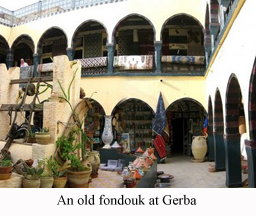Up to this point, the Crown of
Aragon probably did not possess any master plan for expansion into the
Mediterranean. The invasions Mallorca and Valencia had been driven by two
different political entities for different reasons. By early 1250,
however, the Crown of Aragon had become an important maritime power in the
Western Mediterranean. The crown not only gained control of much of the
coastline along the eastern Iberian Peninsula, but also the Balearic
Islands. The crown sat astride one of the most important trade routes in the region.
Its interests in North Africa, and in
Tunis, in particular, were
also expanding. By 1253, the Catalans had established a fondouk
in Tunis with its attendant consul,
and the crown received up to 16,000 denarii from the Hafsid kingdom in
trade revenues and tribute. Naturally,  when Louis IX and Charles of Anjou launched a crusade against Tunis, the
Catalans and James I supported the Hafsids with mercenary troops and
signed a treaty of friendship in February of 1271. While none of this
prevented the surrender of Tunis to the crusaders, the loss of the tribute
became a source of friction between the Crown of Aragon and Charles of
Anjou.
when Louis IX and Charles of Anjou launched a crusade against Tunis, the
Catalans and James I supported the Hafsids with mercenary troops and
signed a treaty of friendship in February of 1271. While none of this
prevented the surrender of Tunis to the crusaders, the loss of the tribute
became a source of friction between the Crown of Aragon and Charles of
Anjou.
The intervention of Charles of Anjou in Tunis created a series of problems for the Catalans. In July 1276, James I died and his son Peter III came to the throne. Almost immediately, Peter tried to renew the tribute paid by Tunis. Between 1277 and 1279, Peter III sent Frederick of Lancia on a series of unsuccessful missions to Tunis, and a revolt in 1279 saw the loss of the fondouk. Fleets sent under Frederick of Lancia and Roger of Lauria reestablished the trade post in Tunis in that same year, but due to maneuvering by the King of Tunis the effort proved fruitless in restoring the tribute or the close relations between the crown and Tunis which had existed before the crusade of 1271. By 1281, Peter made it known that he intended to assemble a fleet to undertake a crusade against Tunis. The objective was obviously to restore the tribute and the lucrative trading rights the Catalans had previously enjoyed.


